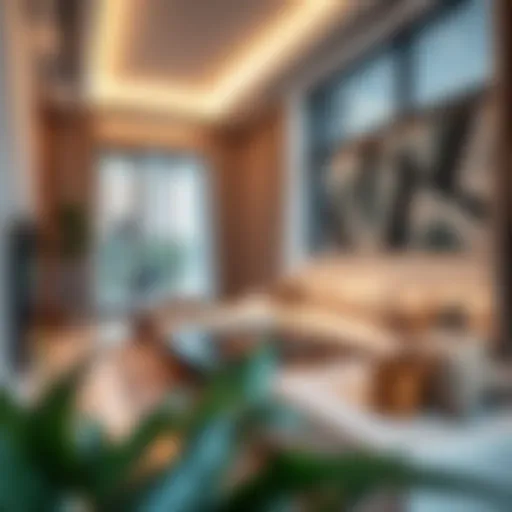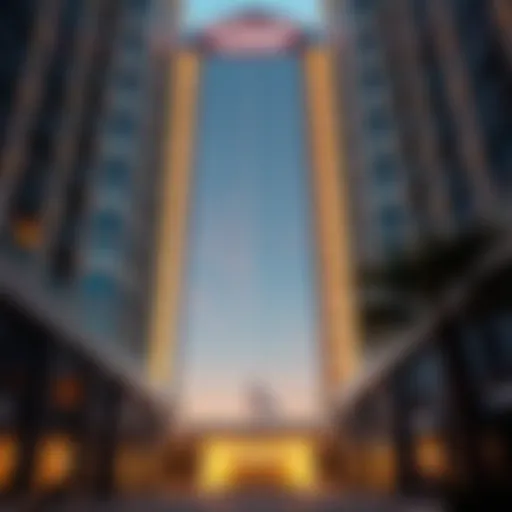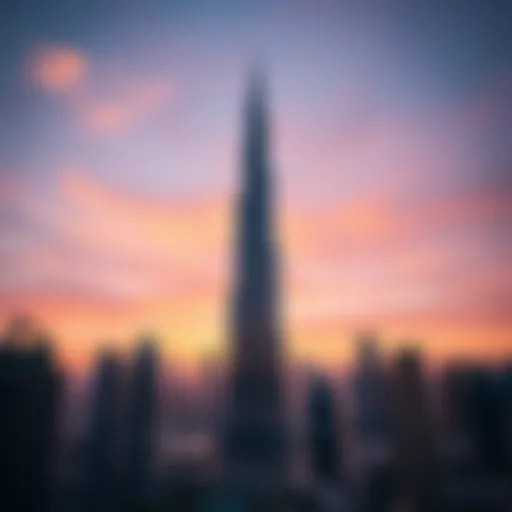Unique Characteristics of Dubai's Real Estate Market
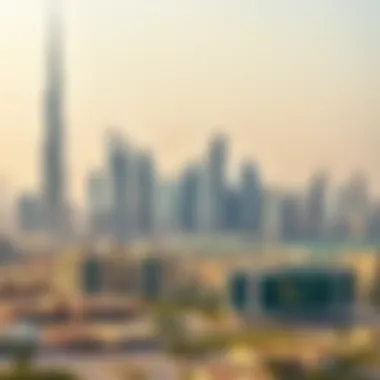
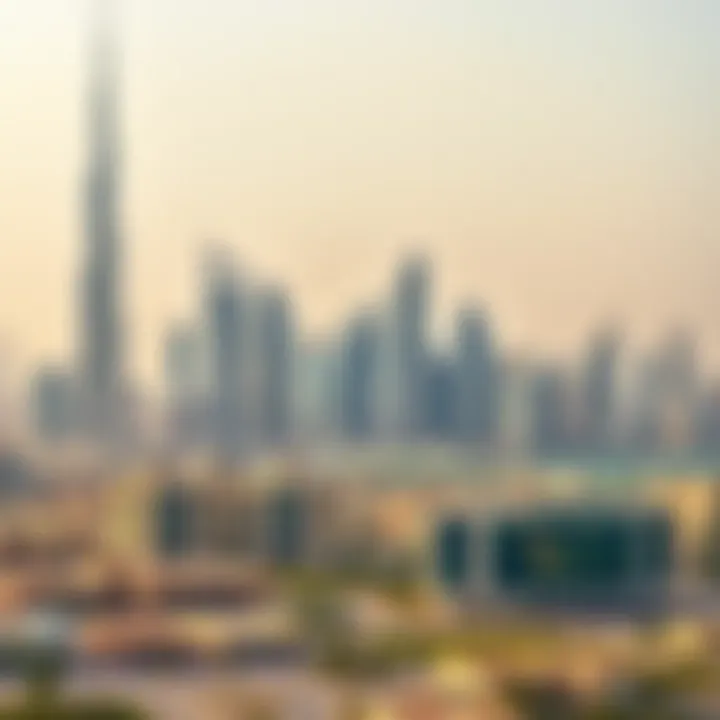
Intro
Dubai has always been a city that captures the imagination. Its skyline, punctured with jaw-dropping architectural feats, tells the story of ambition and innovation. But beyond the monumental Burj Khalifa and luxurious shopping malls lies a complex and vibrant real estate market that offers unique opportunities and insights. Understanding the dynamics of this market is crucial for anyone interested in investing, buying, or working in the region's property landscape.
Throughout this article, we will embark on an extensive exploration of the properties that define Dubai. We will discuss current trends sweeping the market, forecast future movements, and categorize properties into residential and commercial segments. This guide aims to equip investors, homebuyers, agents, analysts, and developers with rich insights that will help them navigate the intricate web of opportunities within Dubai’s real estate scene.
Market Trends
Current Real Estate Trends in Dubai
The property market in Dubai is like a pot of boiling water: always shifting, influenced by myriad factors. As of 2023, several key trends are shaping the market.
- Increased Foreign Investment: With its strategic location and tax benefits, Dubai appeals strongly to global investors. The luxury sector, particularly, has seen a surge in demand from affluent buyers seeking second homes or investment opportunities.
- Evolving Buyer Preferences: There’s a noticeable trend towards larger living spaces. Buyers are increasingly favoring properties with outdoor areas, especially since the pandemic prompted many to rethink their living conditions.
- Smart Real Estate: Technology is embedded now more than ever in property development. Smart homes, where automation controls everything from lighting to security, are turning heads. They not only provide convenience but also add value in the long run.
Future Forecasts for the Dubai Property Market
Looking ahead, industry experts are cautiously optimistic about the future of Dubai's real estate market. Analysts predict steady growth driven by various initiatives like:
- Expo 2020 Legacy: Though delayed, the legacy of Expo 2020 continues to fuel infrastructural development and tourist influx. This event has opened doors to new business opportunities, contributing to the property market's resilience.
- Regulatory Enhancements: Recent changes in regulations that simplify foreign ownership rules and enhance legal frameworks are likely to attract even more investments.
"The real estate market in Dubai is an ever-evolving entity; still, the fundamentals remain strong and promising."
As the market shifts and evolves, staying informed about these changes will be critical for making sound investment decisions.
Property Types
Residential Properties: Overview and Insights
When it comes to residential properties, Dubai is a melting pot. From high-rises to sprawling villas, there is something for everyone.
- Luxury Apartments: Towering buildings in areas like Dubai Marina and Downtown Dubai offer luxurious amenities and breathtaking views. These properties are highly sought after by both locals and expatriates. They remain attractive due to their high rental yields.
- Family Villas: Neighborhoods such as Arabian Ranches cater to families looking for spacious homes. These villas provide a community feel, green spaces, and are generally more affordable than city-center properties.
- Affordable Housing: The government is working towards enhancing the accessibility of housing for lower-income families. Initiatives aimed at creating affordable housing options are vital for a balanced community.
Commercial Properties: Opportunities and Challenges
In the commercial sector, Dubai continues to attract businesses, offering a range of opportunities.
- Office Space: Demand remains robust for premium office spaces, particularly in areas like Business Bay. The flexible working arrangements in post-pandemic times have pushed the market to adapt, leading to more co-working spaces.
- Retail Opportunities: The retail market also flourishes, especially with Dubai's reputation as a shopping destination. However, there's a challenge: online retailers are encroaching on traditional retail space. Businesses need to think outside the box to attract foot traffic.
- Hospitality Sector: With tourism a cornerstone of Dubai’s economy, investments in hotels and resorts continue to grow. However, the challenge lies in maintaining occupancy rates amid global shifts in tourism management.
The ever-thriving dynamics of Dubai’s real estate market presents both vast opportunities and formidable challenges. Understanding these factors can empower stakeholders to navigate with confidence.
For more information, consider checking resources such as Wikipedia, Britannica, or practical insights from forums like Reddit and professional networks on Facebook.
As we venture further into this article, we encourage you to stay curious and open-minded, as each unique property tells a different story.
Understanding Dubai’s Real Estate Landscape
The real estate market in Dubai stands as a captivating tapestry of architectural feats, economic dynamism, and expansive growth. To fathom the unique properties embedded within this desert oasis, one must appreciate the underlying landscape that shapes it. Understanding Dubai's real estate landscape is crucial for investors, homebuyers, and developers alike, as it elucidates the complexities and opportunities present in this vibrant sector.
Initially, it’s essential to grasp the rapid evolution of the market. Over the last few decades, Dubai has transformed from a humble trading port to a global phenomenon, characterized by its luxurious lifestyle and progressive urban planning. The steady influx of expatriates and tourists has not only driven demand but has also catalyzed the creation of spectacular residential and commercial properties.
With a blend of diverse cultures and a robust economy, the city's real estate portfolio ranges from opulent villas nestled in exclusive areas to breathtaking high-rises that kiss the sky. Such variety appeals to a broad spectrum of interests and demands, making it a complex yet intriguing market.
Benefits of Understanding the Landscape
Recognizing the dynamics at play serves several benefits:
- Investment Insight: Knowledge about different areas can play a pivotal role in determining future hotspots.
- Market Trends: Being aware of ongoing trends helps investors align their strategies with market demand.
- Regulatory Awareness: Familiarity with laws and regulations ensures that one remains compliant, avoiding potential pitfalls.
To navigate the intricacies effectively, it is essential to consider various elements that shape the market. Those elements encompass both macro and micro factors, including economic shifts, demographic changes, and global investment trends. Whether one is looking for a modest abode or a luxurious investment, understanding these factors becomes paramount.
Key Points to Consider
- The role of government policies that stimulate growth, including freehold laws and residency options for investors.
- The impact of international events, like Expo 2020, which boosts tourism and trade, further bolstering property demand.
- The importance of cultural appreciation in architecture that enhances property values and aesthetics.
Rather than viewing the market as a singular entity, stakeholders must look at it as a dynamic ecosystem, where varying forces interact continuously. This understanding not only enriches one’s knowledge but also positions them favorably within this competitive landscape. The ability to discern and adapt to the ever-changing environment offers those involved a significant advantage in seizing unique opportunities.
"Investing in Dubai's real estate requires a clear vision and a grasp of its unique landscape. Depending only on trends may lead to overlooking fundamental shifts."
In summary, understanding Dubai’s real estate landscape is imperative for anyone wishing to engage with its unique properties. This insight not only creates room for informed decision-making but also sets the stage for successful investment strategies that resonate with the essence of this bustling metropolis.
Types of Unique Properties in Dubai
The real estate market in Dubai stands out for its diversity and the unique nature of its properties. It's not just about finding a roof over your head; it's about discovering a lifestyle that can only be lived in a city like Dubai. This section will investigate the prominent types of unique properties you can find in this vibrant market, while detailing specific elements, benefits, and considerations that come along with each type.
Luxury Villas
In the heart of Dubai, luxury villas represent the epitome of grandeur. These stunning residences often feature expansive outdoor spaces, private pools, and breathtaking architectural designs, making them a prized property for both investors and families looking for a lavish lifestyle. Many luxury villas are located in gated communities, offering a sense of exclusivity and security.
When considering investment in luxury villas, one must recognize the significant appreciation potential these properties hold. As they fall into the high-end segment of the market, they usually attract wealthy clientele who seek unique experiences and high-quality living. Furthermore, proximity to top-tier amenities such as golf courses, private beaches, and entertainment hubs enhance their appeal.
High-Rise Apartments
High-rise apartments in Dubai reach for the sky, literally. Offering stunning views of the city, these properties appeal to a wide demographic, from young professionals to families. The iconic skyline showcases a variety of architectural styles, and living in these towers provides easy access to urban conveniences.
One of the major draws is the range of amenities that accompany these apartments, from swimming pools and gyms to rooftop gardens and lounges. Investing in high-rise apartments ensures an exciting way of life complemented by the bustling city atmosphere. However, potential buyers should consider the specific location of these buildings, as some neighborhoods are more sought after than others. Choosing wisely could bolster investment returns significantly.
Waterfront Properties
There’s something undeniably appealing about waterfront properties in Dubai. With the city’s stunning coastline and serene canals, these homes offer an unparalleled lifestyle marked by scenic views and leisure activities. Whether it's a waterfront villa or an apartment overlooking the waterway, these properties create a direct link between residents and nature.
Investors looking at waterfront properties often consider them for their potential rental income and long-term value appreciation. They are particularly attractive for foreign buyers who seek a vacation home or a lucrative investment. Having access to beaches, marina facilities, and water sports right at your doorstep can be a huge selling point, making these properties highly desirable.
Mixed-Use Developments
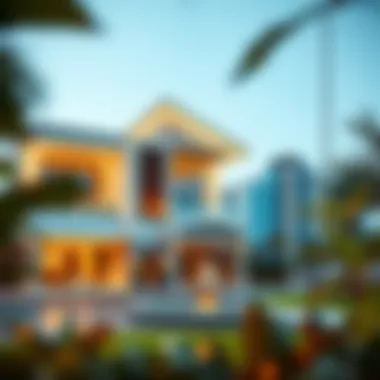

Mixed-use developments are the modern take on urban living and stand out in Dubai’s real estate landscape. These innovative properties seamlessly blend residential units, retail spaces, and recreational facilities. The idea behind such developments is to create a community where residents can live, work, and play without having to travel great distances.
The benefits of investing in mixed-use developments are multifaceted. With the growing trend of urbanification, these properties become increasingly attractive to buyers. They often guarantee steady foot traffic, thus fostering a vibrant community and enhancing business opportunities. Moreover, the lifestyle convenience they promise is invaluable, catering to the needs of a dynamic urban demographic.
"In Dubai, unique properties are not just structures; they are reflections of a lifestyle and investment opportunity intertwined."
By understanding these various types of unique properties, investors and potential homebuyers can navigate the complex landscape of Dubai's real estate market more effectively, making informed decisions that align with their financial goals and lifestyle preferences.
Architectural Innovations in Dubai
Architectural innovations in Dubai serve as a testament to the dynamic evolution of the city’s skyline and its ever-changing real estate landscape. The blend of tradition and modernity creates a visual feast while encouraging sustainable building practices that contribute towards the health of both the architecture and environment. These innovations are pivotal as they not only influence aesthetic tastes but also address critical factors like energy efficiency, livability, and the overall economic viability of new projects.
The city's commitment to cutting-edge design and technology is evident in various developments. These approaches not only enhance property value but also resonate with investors looking for unique and future-ready properties. In essence, understanding these innovations offers insights to investors, homebuyers, and developers keen on capitalizing on what's ahead in this bustling market.
Sustainable Building Practices
Sustainable building practices are at the heart of architectural innovation in Dubai. Integrating traditional Middle Eastern designs with eco-friendly technologies has become the norm. For instance, projects like The Sustainability Pavilion showcase how passive design elements alongside solar technology can significantly reduce emissions.
Benefits of sustainable practices include:
- Reduced operational costs: With energy-efficient systems, homeowners save in the long run.
- Increased property value: As green technologies become more recognized, properties built with these in mind can demand higher prices.
- Positive environmental impact: Adopting sustainable construction methods helps mitigate the ecological footprint of urban growth.
However, there are considerations to take into account. Investors must be aware of the potential higher upfront costs associated with sustainable materials and practices. Nevertheless, these costs can be justified when viewed through the long-term lens of savings and market attractiveness.
Iconic Skyscrapers
Dubai is famous for its skyline filled with iconic skyscrapers that push the boundaries of design and engineering. Structures like the Burj Khalifa and the twisting Cactus Tower are not just visually stunning; they symbolize the ambition and creativity that characterize this city.
These skyscrapers often employ:
- Innovative materials that withstand extreme heat and winds.
- Advanced engineering techniques enabling designs that seem to defy gravity.
- Luxury amenities that cater to high-net-worth individuals, making them more desirable.
The significance of these innovations goes beyond mere aesthetics. Skyscrapers serve as hubs of commerce, residence, and leisure, attracting not just tourists, but also businesses eager to establish their presence in one of the world’s most competitive markets. Thus, understanding the architectural innovations behind these landmarks allows potential investors to recognize their true value.
"Unique properties in Dubai are proof that architecture is not just about buildings; it’s about creating a story that resonates through time."
Market Trends and Dynamics
Understanding the market trends and dynamics of Dubai's real estate sector is vital for investors, homebuyers, and industry analysts alike. This topic serves as a barometer of the current property landscape, providing clear indicators on where opportunities lie and what challenges might be on the horizon. In such a fast-paced and volatile market, staying ahead of trends can be the difference between capitalizing on a lucrative investment and facing potential pitfalls.
The unique properties in Dubai don’t just exist in isolation; they are influenced by various factors, including economic conditions, social sentiments, and infrastructural developments. Comprehending the nuances of these trends can empower stakeholders to make better decisions and strategies, aligning their interests with the evolving market dynamics.
Current Market Insights
As of 2023, the Dubai real estate market is witnessing notable shifts. Recently, there has been a marked increase in demand for luxury properties, particularly in areas such as Palm Jumeirah and Downtown Dubai. Investors are increasingly focused on unique properties that offer not just a home, but a lifestyle. This growing preference is reflected in soaring prices for luxury villas and high-end apartments.
Moreover, the government's initiatives, like the Golden Visa program, continue to attract foreign investors. Given the exodus of talent from various global markets, Dubai stands as a beacon. Increased international attention bolsters the investment potential of properties in sought-after locations, driving up prices and reducing inventory.
Key Statistics
- Recent reports indicate a 20% growth in property sales year-on-year.
- Rental prices for villas have increased by 12% across prime neighborhoods.
Investment Opportunities in Unique Properties
The legacy of Dubai's real estate sector isn't just in its towering skyscrapers and lavish villas—it's in the myriad investment opportunities that these unique properties present. As the Emirate continues to thrive, the allure of investing in such distinct properties has caught the eye of investors from all corners of the globe. When looking to tap into the potential of Dubai's market, it’s essential to recognize what factors make these investments both appealing and viable.
Identifying Hotspots
Dubai is a city that never rests; new developments and neighborhoods spring up at a staggering pace. These emerging areas offer lucrative opportunities, especially for long-term investors. To identify the hotspots, one must consider certain criteria:
- Infrastructure Development: Areas with new transport links, schools, and healthcare facilities tend to attract both residents and businesses. For instance, regions near the Dubai Metro expansion have seen a surge in property value.
- Economic Growth Concentration: Locations near burgeoning industries like technology and tourism usually gain traction. Areas around Dubai Silicon Oasis and Dubai Investment Park are two such spots.
- Cultural Appeal: Properties that are close to leisure and entertainment hubs tend to draw tenants and buyers. The vicinity of The Dubai Mall and Expo 2020 site can be eye-catching for many.
In summary, to snag a solid investment, do thorough research on the infrastructure plans and the economic landscape of neighborhoods.
Understanding ROI
Return on Investment (ROI) is the golden ticket for investors evaluating the profitability of a property. In Dubai, the metrics that define a healthy ROI are often multifaceted.
- Rental Yields: Some properties in Dubai yield rental returns of around 6-10%, a number that is attractive when compared to many global cities. For instance, high-rise apartments in Downtown Dubai often command premium rents, leading to favorable yields.
- Appreciation Potential: Unique properties, especially in prime locales, tend to appreciate over time. Analyzing past trends can provide clues; the market has often rebounded from dips, reflecting resilience.
- Cost Factors: Keep an eye on variables like maintenance fees, service charges, and community regulations, all of which will impact your overall yield.
"Investors must take care to analyze the expenses associated with property management and keep an eye out for developments that align with future plans for the area."
Overall, understanding the dynamics of ROI helps in making enlightened decisions that align with one’s financial goals. It’s all about striking the right balance between risk and reward in this ever-evolving market.
The Role of Government Regulations
Government regulations serve as the backbone of Dubai's real estate market, shaping and defining the landscape of property investment and ownership in the city. As the market continues to grow in both size and complexity, understanding the implications of these regulations becomes increasingly crucial for investors, homebuyers, analysts, and developers alike. The government provides a framework that not only enhances the market's integrity but also invites foreign investment, positioning Dubai as a global property hotspot.
To begin with, the regulatory environment influences how properties can be bought, sold, and developed. With specific laws put in place—such as those governing ownership rights for foreign investors and various zoning laws—stakeholders can navigate the market with more confidence and security. These regulations help in fostering trust among buyers, ensuring that ownership is not only clear but also protected under the law.
Moreover, let's delve deeper into the components that shape this regulatory framework.
Regulatory Framework
The regulatory framework of Dubai's real estate market is extensive and meticulously crafted. Governed by several key entities, including the Dubai Land Department (DLD), the Real Estate Regulatory Agency (RERA), and various other local authorities, this set of regulations covers diverse facets of property management and ownership.
Here are some important elements of this framework:
- Foreign Ownership Rules: Foreigners can buy properties in designated areas, known as freehold areas, which encourages international investment.
- Registration Requirements: All real estate transactions must be registered with the DLD, ensuring transparency and accountability.
- Quality Control: Through RERA, the government implements regulations to maintain building standards and protect buyers from subpar developments.
- Real Estate Mortgage Regulation: Various laws regulate mortgage financing, safeguarding both lenders and borrowers.
These elements work in harmony to create a balanced environment for investment. Investor confidence is bolstered as they engage within a system that is not only well-structured but also monitors and enforces compliance effectively.
Impact on Investors
The implications of regulations stretch deep into investor strategies. Understanding the nuances of these rules can make or break investment opportunities. Here's how:


- Investment Security: Investors operating in a transparent regulatory environment can make financial decisions with a clearer understanding of the risks involved—leading to better strategic planning.
- Market Stability: By keeping a close watch on real estate activities, regulations prevent overheating of the market, thus ensuring a more stable investment climate.
- Access to Resources: Various government initiatives, including financial incentives and support for developers, enhance investment potential, making Dubai more attractive for domestic and foreign stakeholders.
With knowledge of the regulations in hand, investors are not just passive participants but informed players who can navigate the complexities of Dubai's real estate market with assurance.
Challenges in the Dubai Real Estate Market
Understanding the difficulties that Dubai's real estate market faces is crucial not only for potential investors but also for existing homeowners and industry professionals. This knowledge enables individuals to navigate the landscape more skillfully, helping to make empowered decisions based on both current trends and foreseeable obstacles. The challenges impact not only property values but also the overall attractiveness of the market for foreign investments and local buyers alike. By pinpointing specific issues, stakeholders are better equipped to craft strategic responses and perhaps, grasp the opportunities hidden in adversity.
Market Saturation
Dubai's real estate market has grown at an unprecedented rate over the years, leading to a peculiar phenomenon of market saturation. Towering skyscrapers and residential communities sprouted like mushrooms after rain, at times leading to too much supply chasing insufficient demand. This saturation has several implications for current and potential investors:
- Declining Prices: With so many properties available, prices can drop, creating both a challenge and an opportunity. Buyers might snag deals, but sellers may face difficulty offloading properties.
- Investment Risk: The overabundance of real estate can make it harder to predict future values, adding uncertainty to investment decisions. A property that may seem appealing today could lose value tomorrow if the market remains over-saturated.
- Quality vs. Quantity: Developers may prioritize quantity over quality amid competition, leading to properties that lack uniqueness or long-term value.
Tackling saturation involves finding a balance—a delicate dance between new constructions and the rejuvenation of existing spaces. Developers and investors seek innovative designs or repurposed properties to find their niche in a crowded market. This is where creative minds shine, finding avenues to bring life back into neighborhoods that may have lost their luster.
Economic Fluctuations
Economic fluctuations play a pivotal role in shaping the real estate scene in Dubai. Since the market is closely tied to global economic conditions, even minor shifts can send ripples through property values. Factors such as oil prices, tourism dynamics, and geopolitical tensions directly affect investor confidence. Here are some key aspects to consider:
- Relation to Oil Prices: Given Dubai's historical reliance on oil revenues, any decline in oil prices can lead to reduced spending on luxury properties, which makes up a significant portion of the market.
- Global Economic Environment: The broader economic climate influences consumer behavior; when countries face recession, investments in Dubai can slow down, impacting property sales and development projects.
- Currency Fluctuations: The value of the United Arab Emirates Dirham against other currencies can affect purchasing power for foreign buyers. A stronger dollar might deter investments, as prices appear elevated compared to other markets.
Economic adaptability is vital. Those involved in the Dubai real estate scene must keep an ear to the ground, staying informed about global trends and local measures taken to balance economic shifts. Understanding how to ride the waves of change can turn potential setbacks into growth opportunities.
Key Takeaway: Awareness of market saturation and economic fluctuations is essential for anyone looking to invest or operate in Dubai’s real estate market. Such knowledge allows for informed decision-making and a proactive approach to challenges.
Cultural Influence on Property Design
The cultural tapestry of Dubai plays a crucial role in shaping its architectural landscape. The city is not just a financial hub; it's also a melting pot of various cultures, traditions, and lifestyles. This uniqueness is reflected in the design of properties across the emirate, where traditional elements blend flawlessly with modern designs. By understanding these cultural influences, investors and homeowners can make informed decisions about the unique properties in Dubai.
Embracing Heritage
Dubai’s architectural design draws heavily from its rich heritage. From intricate Islamic motifs to traditional wind towers, there’s a deep respect for the history that pervades the area. Buildings like the Sheikh Mohammed Centre for Cultural Understanding highlight this cultural homage, showcasing how ancient elements can harmonize with contemporary architecture. Many property developers now incorporate features such as mashrabiya screens and arabesque patterns, preserving cultural identity in a rapidly modernizing city.
Investors should consider these heritage aspects when seeking properties. Such features not only enhance aesthetic value but also attract buyers who appreciate cultural authenticity. Properties that respect and reflect local heritage often command a premium. Therefore, tapping into Dubai's rich cultural heritage can be a smart investment strategy. Furthermore, the UAE’s commitment to preserving its culture means that these heritage elements will likely gain further appreciation over time.
Modern Aesthetics
Alongside heritage, modern aesthetics have firmly taken root in Dubai's property landscape. Developers are increasingly experimenting with unconventional materials and forms, creating sleek and futuristic designs that push the limits of architectural creativity. Properties like the Burj Khalifa and the Museum of the Future are prime examples of how Dubai marries cutting-edge design with cultural context.
Modern aesthetics appeal to a younger demographic and international investors. High-rise buildings adorned with glass facades and open spaces offer luxurious living while meeting the demands of contemporary lifestyles. Moreover, integrating smart home technology into these structures captivates tech-savvy buyers, making properties more appealing.
In the world of Dubai real estate, staying ahead of design trends can significantly impact investment returns. Properties that embrace modern aesthetics—while still considering cultural elements—can strike a balance that ensures relevance in an ever-evolving market.
"The serenity of tradition blends beautifully with the dynamism of modernity, creating a unique landscape in Dubai that appeals to a diverse audience."
In summary, as Dubai continues to evolve, the cultural influences in property design remain pivotal for both investors and homeowners alike. Embracing heritage while integrating modern aesthetics ensures that properties not only stand out but also appreciate over time. Ensuring these elements are part of any property strategy in Dubai could be the key to unlocking successful investments.
For more in-depth insights on Dubai's rich architectural heritage, consider visiting Wikipedia or Britannica.
Through understanding these cultural influences, one not only navigates the market more adeptly but also contributes to the preservation of what makes Dubai truly unique.
Living in Unique Properties: Lifestyle Aspects
Living in unique properties in Dubai brings a different flavor to the everyday experience of its residents. It's not just about possessing a piece of real estate; it's about embracing a way of life that is rich in luxury, culture, and community. This section sheds light on why understanding the lifestyle aspects of living in these distinctive properties matters, focusing on the elements that enhance the living experience and provide insight for investors, homebuyers, and developers alike.
Community Lifestyle
In Dubai, community lifestyle is a tapestry woven from diverse threads. You can find neighborhoods rich in culture and history one minute and ultra-modern living spaces the next. The Madinat Jumeirah, for example, offers a blend of traditional Arabian architecture and modern luxury, creating a sense of belonging.
Residents often hold communal events, festivals, and activities which foster a spirit of camaraderie. For instance, residents in the Dubai Marina enjoy vibrant social scenes, with waterfront dining and cultural events that draw people together. Creating community ties becomes easier when everyone is just a walk away from the local market or beach. Living here means not just occupying a space but actively engaging in a lifestyle that promotes social interaction.
From family-centric communities in Arabian Ranches to bustling urban lives in the Downtown Dubai, there's something for everyone. It’s about how you fit into the neighborhood, sharing joys, experiences, and integrating into the local culture, echoing a sense of home that transcends mere belongings. This sense of belonging can often be a significant factor in property valuation as well, appealing especially to investors.
Amenities and Services
When it comes to unique properties, amenities and services play an undeniable role. It's about the cherry on top, making life smoother and more enjoyable. Here, we dissect some key amenities that elevate living experiences in Dubai:
- Spas and Wellness Centers: Many luxury towers and residential compounds come equipped with world-class spas. Residents can unwind with spa treatments without needing to step out.
- Fitness Facilities: State-of-the-art gyms and fitness centers are common. High-rise developments often provide fitness resources that rival commercial gyms, ensuring residents can maintain healthy lifestyles conveniently.
- Pools and Leisure Areas: Infinity pools overlooking the skyline, private cabanas, and leisure areas are becoming standard. Having access to these spaces enhances relaxation and leisure time, making a home feel more like a resort.
- Concierge Services: High-end properties often offer concierge services that can take care of just about everything—from booking a table at the hottest restaurant to arranging travel plans. This level of convenience is quite appealing, especially for busy professionals or families.
"Access to these unique amenities not only enhances the living experience but also speaks volumes about the investments potential buyers can expect."
With these features, unique properties in Dubai don't just provide shelter; they cater to a lifestyle that blends luxury with convenience, drawing people who seek more than just a place to live. A home in Dubai often means being part of an all-inclusive lifestyle that balances work, leisure, and a vibrant community life.
In summary, understanding the lifestyle aspects associated with unique properties in Dubai sets the stage for better investment decisions and a richer living experience. Being aware of the nuances between community living and available amenities is crucial for making informed choices in an ever-evolving market. Keywords like community, amenities, and lifestyle satisfaction become significant markers when discussing the value of real estate in this dynamic city.
For those diving into the unique property market in Dubai, realizing the advantages of community and amenities isn’t just beneficial; it’s essential.
Financing Unique Properties
The financial landscape surrounding unique properties in Dubai is an essential component of the real estate market. As potential buyers and investors look to navigate this vibrant sector, understanding financing is fundamental. This aspect helps investors make informed decisions by evaluating their options, understanding costs, and evaluating long-term implications. The various financial instruments available enable individuals to not only acquire property seamlessly but also maximize their investment's potential.
Available Financing Options
In Dubai, buyers have a wealth of financing choices tailored to fit the diverse needs of the property market. These options include:
- Mortgages: Many UAE banks and financial institutions provide competitive mortgage rates, often targeting expatriates as well as locals. Borrowers typically look for a mortgage that best fits their financial circumstances.
- Developer Financing: Developers often enable direct financing plans which can ease the burden of upfront costs. These plans allow buyers to pay in instalments, often aligned with construction milestones, which can lessen financial pressure in the early stages of property ownership.
- Islamic Financing: Aligning with Sharia principles, Islamic financing structures offer an alternative for buyers seeking compliant methods to acquire property. This could include Murabaha or Ijara agreements that do not involve interest payments.
- Personal Loans: Some buyers opt for personal loans to cover a portion of the property cost. It’s crucial to consider that these loans can come with higher interest rates compared to mortgages.
This variety enables prospective homeowners and investors to pin their hopes on customized plans that align with their financial situations.
Understanding Mortgages
Mortgages are perhaps one of the most popular financing options for acquiring unique properties in Dubai. A mortgage is essentially a loan secured by the equity of the property itself, enabling buyers to own a desirable property while spreading out payments over time. A few key elements to keep in mind:


- Down Payment: Typically, banks require a minimum down payment. For non-residents, this can range from 20% to 30%, while locals might secure lower rates. The size of this down payment can significantly impact monthly repayments.
- Interest Rates: In Dubai’s competitive market, interest rates can vary widely based on the lending institution and the buyer's financial profile. Understanding whether a fixed or variable interest rate is more advantageous based on market trends is crucial.
- Loan Tenure: Mortgages can have a tenure that ranges from as little as 5 years to over 25 years. Longer loan tenures often lead to lower monthly payments but can result in paying significantly more interest overall.
- Prepayment Penalties: It’s worth checking if your mortgage agreement includes penalties for early repayment, as this can impact long-term financial plans.
A comprehensive understanding of these elements prepares buyers to make informed choices in a market full of possibilities. This knowledge arms investors and homeowners to better navigate, understand, and possibly capitalize on Dubai's unique property landscape.
"Knowledge is power, and in real estate, it can make the difference between a good investment and a regrettable one."
For more detailed information on mortgage options and local financial practices, check out resources like Dubai Land Department or UAE's Central Bank.
By getting a grip on financing unique properties, investors can position themselves strategically and capture the opportunities that Dubai’s real estate market presents.
Neighborhood Insights
Understanding the various neighborhoods within Dubai is crucial for investors, homebuyers, and even agents involved in the real estate scene. Each location boasts its own unique identity, amenities, and appeal. Knowing these nuances can greatly influence investment decisions and enhance one's living experience.
When considering property investment, the location often emerges as the marrying factor — a prime place can escalate a property’s value while offering residents comforts like schools, transport links, and recreational areas. For those looking at Dubai’s real estate landscape, staying updated on the dynamic neighborhoods can help navigate through the bustling market.
Emerging Neighborhoods
Dubai’s property market is not just about the glittering towers of Downtown; it extends into emerging neighborhoods that are gradually becoming the next hot spots for investment. Neighborhoods such as Dubai Creek Harbour and Dubai South are capturing attention for their development potential and innovative concepts. These areas represent the fresh face of what Dubai can offer and are equipped with modern infrastructure and plans for community living.
- Dubai Creek Harbour: Once a sleepy area, this neighborhood is ambitiously expanding with plans that include residential, commercial, and leisure facilities. The goal here is to blend nature with urban living, making it an attractive option for families and young professionals alike.
- Dubai South: Positioned to house the Expo 2020 site, this area has been designed with futuristic visions in mind. The plans encompass a variety of residential units, from affordable housing to more lavish offerings, creating a diverse community.
Benefits of investing in these emerging neighborhoods include lower entry prices compared to established areas and significant growth potential as developments progress. However, it’s wise to keep an eye on infrastructure developments, as these can either bolter or deter growth.
Established Communities
While emerging neighborhoods certainly have their appeal, established communities like Jumeirah and Marina carry a certain prestige that comes with a well-developed infrastructure and a variety of amenities that cater to a wide range of lifestyles.
- Jumeirah: Known for its luxury villas and proximity to pristine beaches, Jumeirah attracts affluent buyers looking for relaxation and leisure right at their doorstep. The area is characterized by its serene atmosphere, beautiful landscapes, and top-tier educational institutions.
- Dubai Marina: A hub of activity, this waterfront community offers both high-rise living and a vibrant atmosphere with endless dining and entertainment options. With its stunning views and active lifestyle, it appeals significantly to expatriates and younger professionals.
Investing in established neighborhoods generally brings a sense of stability and predictable growth, making it attractive for those who seek both residential satisfaction and return on investments. However, prospective buyers should be mindful of increased competition and higher property prices in these sought-after areas.
"The value of a property is not only based on its physical attributes but also its surrounding environment and community dynamics."
The Future of Unique Properties in Dubai
As Dubai stands at the crossroads of tradition and innovation, the landscape of its real estate market is primed for transformation. The future of unique properties in this city is not merely a projection; it's an unfolding narrative shaped by various significant elements. The incessant growth and ambition of the emirate reflect a desire to establish a property market that is dynamic, competitive, and reflective of the city’s essence. Understandably, these unique properties become vital not only for investment purposes but also for fostering an identity that mirrors Dubai's opulence and cultural richness.
The strategic positioning of developers to spotlight avant-garde projects and sustainable practices ensures that unique properties in Dubai will continue to draw interest from investors, homebuyers, and international entities. As consumer preferences evolve, so too must the offerings, pointing towards a future that embraces cutting-edge solutions while respecting the historical and cultural contexts. This section will delve into two key aspects: innovative projects set to change the skyline and crucial long-term sustainability measures that resonate with modern-day needs.
Innovative Projects on the Horizon
Innovation is the heart of Dubai’s real estate scene. Developers are increasingly focusing on creative and distinctive projects that promise not just luxury but also a unique living experience. Take the upcoming Dubai Creek Tower, for instance, which is poised to be taller than the Burj Khalifa. This ambitious project isn't merely about height. It embodies an artistic vision, integrating nature with state-of-the-art technology, blurring the lines between the built environment and the beautiful landscape that surrounds the city.
Additionally, other projects such as the Dubai Horizon and the Global Village Expansion echo the same sentiment. Such endeavors are key to attracting international visitors and retaining the appeal of residential spaces.
Some upcoming innovative projects to watch include:
- The Museum of the Future: This architectural masterpiece ain't just an attraction; it sets the stage for a myriad of technological advancements and intelligent living concepts.
- Dubai Marina’s New Waterfront Development: Focusing on luxury with an emphasis on community spaces and recreational facilities, this project is designed to cater to both locals and tourists alike.
With technology at the center of these projects, one can’t help but imagine how augmented and virtual reality will allow prospective buyers to experience properties in a more immersive manner, thus revolutionizing the buying process.
Long-Term Sustainability Measures
As the world leans towards sustainability, Dubai is astutely aware of the pressing need to balance its rapid development with eco-friendly solutions. The city’s government has laid down frameworks for sustainable building practices. Expect mandates that encourage the incorporation of sustainable materials, energy-efficient designs, and waste management systems in all new and existing properties.
An example of this commitment is the Dubai Clean Energy Strategy 2050, which seeks to make Dubai a global center for clean energy and green economy. Projects that utilize renewable resources, such as solar and wind energy, not only address environmental concerns but also appeal to conscientious investors who prioritize sustainability in their portfolios.
Incorporating features such as rooftop gardens, green walls, and solar panels into buildings is increasingly common. These measures not only reduce environmental footprints but enhance the aesthetic appeal of properties, creating enviable living spaces. Furthermore, with ongoing dialogues about climate resilience, it is prudent for investors to understand that long-term sustainability measures are no longer optional but essential for future-proofing investments in Dubai's real estate sector.
Technology's Impact on Real Estate
The realm of real estate in Dubai is not merely about stunning architecture and vibrant landscapes; it intertwines with cutting-edge technology in ways that reshaping the market. From the rise of smart homes to comprehensive digital marketing strategies, technology's footprint is profound and ever-expanding. For investors and homebuyers alike, understanding these tech trends can mean the difference between a wise investment and a missed opportunity.
Smart Home Features
As technology evolves, so does the concept of what a home can be. Today’s buyers expect more than just a roof over their heads—they are looking for smart features that simplify life and improve efficiency. Smart home technology encompasses everything from automated lighting and climate control to advanced security systems and energy management.
For instance, homes equipped with smart thermostats can learn the residents’ habits and adjust temperatures accordingly, leading to substantial energy savings. Moreover, integration of voice-activated assistants like Amazon's Alexa or Google Assistant creates a seamless experience, allowing homeowners to control various systems with just their voice.
"The integration of smart technologies is not just a trend; it’s becoming a standard expectation among homebuyers."
Some key benefits of smart home features include:
- Improved energy efficiency
- Enhanced security with smart cameras and alerts
- Greater convenience through automation
- Increased property values, as homes with smart features fetch higher prices on the market.
Virtual Tours and Digital Marketing
The advancement of technology has also revolutionized how properties are marketed and viewed. Virtual tours stand out as one of the most impactful innovations in this sector. Potential buyers can now tour properties from the comfort of their homes, thanks to immersive 3D walkthroughs and augmented reality applications. This not only saves time but also allows buyers to experience properties in detail without geographical limitations.
Moreover, digital marketing strategies have transformed typical approaches to selling properties. Platforms like social media and real estate websites use algorithms to target specific demographics, ensuring that listings reach the right audience. Enhanced visual content, such as drone photography and virtual reality, make listings more attractive and accessible, drawing attention in a crowded market.
Here are a few reasons why virtual tours and digital marketing are critical in today’s real estate:
- Broader Reach: Property listings can gain global visibility.
- Cost-Effective: Reduces the need for in-person showings, lowering marketing costs.
- Engagement: High-quality visuals and interactive content can boost buyer interest significantly.
Embracing technology is no longer an option but a necessity for navigating Dubai’s dynamic property landscape. Investors and homeowners must stay informed about these innovations that shape the market, influencing not just buying decisions but the very future of real estate itself.
The End
The conclusion serves as a critical juncture in understanding the phenomena that define Dubai’s real estate market. This summary not only encapsulates the discussions held throughout the article but also extends a myriad of insights into the current and future landscape of unique properties in this remarkable city.
Summarizing Key Takeaways
- Diverse Property Types: The Dubai real estate scene is marked by an array of properties, ranging from luxury villas to high-rise apartments and exclusive waterfront properties. This diversity is not just about variety but also about fulfilling different lifestyle aspirations.
- Investment Potential: For investors, recognizing emerging neighborhoods and understanding the factors that influence return on investment is vital. The sophisticated market dynamics offer numerous opportunities, but they come with their own challenges and considerations.
- Regulatory Insights: Government regulations play a crucial role in shaping the real estate landscape. Understanding these regulations can significantly impact investment decisions and client advisement.
- Cultural Significance: The intertwining of heritage with modern aesthetics speaks volumes about the identity of Dubai. Unique properties often reflect cultural narratives, enhancing their market appeal.
Final Thoughts on Investment in Dubai's Unique Properties
Investing in Dubai’s unique properties can be rewarding, yet it is not without its considerations. A deep understanding of the market trends, cultural influences, and regulatory frameworks equips investors to navigate the complexities of real estate in Dubai effectively.
- Homeliness vs. Profit: While making a sound investment, future buyers should keep in mind their personal needs against long-term profitability. Is it about finding a beautiful abode or securing a wise asset for future generations?
- Market Vigilance: Staying informed and agile in response to economic fluctuations is crucial. The Dubai market is known for its rapid changes, and investors who watch it closely will likely capitalize on the best opportunities.
- Community Engagement: Future investors should also consider the lifestyle aspects of any purchase. Properties that foster community and connect individuals to their surroundings can enhance both living experience and property value.









